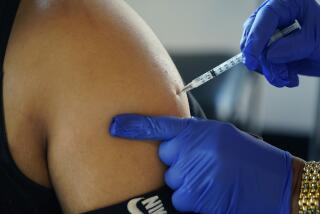Monoclonal Feud : Hybritech Aims Suit at Abbott
- Share via
Hybritech officials said Monday they had asked a U.S. District Court in Los Angeles to prohibit Chicago-based Abbott Laboratories from marketing eight testing kits that use monoclonal antibody technology.
The San Diego-based subsidiary of Indianapolis-based Eli Lilly & Co. alleged that the testing devices, which generate 7% of Abbott’s diagnostic testing revenues, infringe on a Hybritech patent covering certain monoclonal antibody technology.
The eight disputed tests use monoclonal antibodies to detect medical conditions which include cancer, pregnancy, hepatitis and a thyroid disorder.
“We intend to vigorously defend our patents,” an Eli Lilly spokeswoman in Indianapolis said Monday.
The suit, filed last week, mirrored a 1984 patent suit that Hybritech brought in San Francisco District Court against Mountain View-based Monoclonal Antibodies Inc. That suit, which is still in litigation, alleged that Monoclonal Antibodies’ testing kits infringed upon Hybritech’s monoclonal antibody patent.
Earlier this year, a U.S. Court of Appeals in Washington, D.C., reversed the San Francisco court’s ruling that Hybritech’s monoclonal antibody patent was not valid. The district court now must determine if Monoclonal Antibodies Inc.’s tests infringed upon the patent.
“We think that the patent is invalid and we think the court will deny their request for a preliminary injunction,” said Abbott General Counsel Lael Johnson. “We think that in a trial we will prevail.”
Abbott will argue that Hybritech’s monoclonal antibody technology cannot be patented because patent law does not pertain to “processes that are obvious” to skilled scientists, Johnson said.
“Hybritech merely pieced together two already existing technologies to develop its monoclonal antibody-based tests,” he said, “But obviously we’ll eventually have to convince the appellate court of that fact.”
“The new suit is not surprising, because Hybritech and Abbott are in a very competitive battle,” said Munro Pitt, a biotechnology industry analyst with Shearson Lehman Bros., a New York-based investment firm.
In light of the appellate court ruling that Hybritech holds a valid patent, “the suit against Abbott is a logical extension,” Pitt said. “Hybritech has aggressively targeted its products to compete against Abbott’s products.”
“Other (companies) could potentially be at risk if Hybritech prevails and the patent is upheld,” Pitt said. “Then Hybritech could ask for licensing fees or it could play hardball and exclude people from the business.”
More to Read
Inside the business of entertainment
The Wide Shot brings you news, analysis and insights on everything from streaming wars to production — and what it all means for the future.
You may occasionally receive promotional content from the Los Angeles Times.










